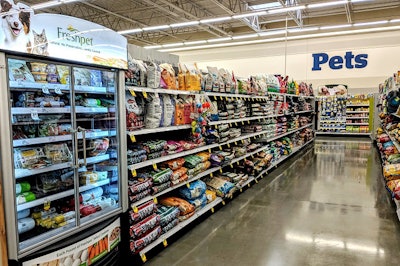
To succeed in the face of increasing online competition, traditional pet stores often turn to tailored and unique pet food inventories, along with other products. For example, nearly 40 percent of U.S. pet specialty retailers said they expect frozen, refrigerated and freeze-dried pet foods to be among the largest growth categories for their stores in the next 12 months, according to a survey conducted by Pet Business magazine.
That compares to less than 10 percent of online retailers seeing those categories as growth drivers. Of course, it’s not surprising that frozen or refrigerated pet foods would rank low for e-commerce platforms, given logistical issues with keeping those types of products safe and cold or frozen throughout the delivery cycle — yet the categories still garnered about 6 percent support from online retailers in the survey.
What is surprising is that freeze-dried pet foods barely registered for online retailers. The way these products are produced and preserved, they seem like naturals for e-commerce (along with brick-and-mortar sales), and they also continue to grow in popularity among pet owners. According to data from GfK, sales of freeze-dried pet meals increased 32 percent in the U.S. pet specialty channel in 2017, and that doesn’t even include sales of freeze-dried treats.
Private label on the rise, grain-free pet foods still popular
Another category of note in the survey was private-label products. While not specified as pet food (meaning the category could encompass many types of pet products), we know that large online retailers like Amazon and Chewy.com continue to launch their own lines of pet food. And indeed, in the Pet Business survey, almost 20 percent of online retailers said they see private-label as a growth driver.
Perhaps even more interesting is that about 25 percent of brick-and-mortar retailers also chose private label for growth in the next 12 months. With pet food, this category has traditionally not been a major one in the U.S., lagging behind other countries and regions around the world. Yet perhaps that is changing, as retailers of all types (not just traditional pet stores) see benefits in offering their own lines of unique pet foods, even if that is no longer a differentiator from online platforms.
Not surprisingly, grain-free pet foods and treats continue to be popular among brick-and-mortar pet retailers, with nearly 40 percent in the survey selecting the category as a growth driver, compared to about 20 percent for online retailers. (It’s not clear whether the survey was conducted before or after the Food and Drug Administration’s July 12 alert about atypical cases of canine dilated cardiomyopathy possibly being linked to some grain-free diets.)
Other popular categories for brick-and-mortar pet retailers include products labeled “made in the USA” (also seen as growth drivers by online retailers) and, also not a surprise, products containing cannabidiol, or CBD.
Natural pet food claims evolving?
Products labeled as natural or eco-friendly (in this case again, all products, not just pet foods) seem to be falling in popularity for brick-and-mortar retailers — just 21 percent chose the category — while still being a major driver for online purveyors, at about 42 percent. Mark Kalaygian, publishing director and editor-in-chief of Pet Business, commented that this is perhaps evidence of those types of claims evolving in both retailers’ and consumers’ eyes.
“That is not to say that natural and eco-friendly pet fare is not important in traditional retail settings — in fact, they remain vital elements of a well-rounded selection,” Kalaygian wrote. “Rather, I view this as an indication that brick-and-mortar retailers have come to realize that products touting general terms such as ‘natural’ and ‘eco-friendly’ must now go further to qualify why they deserve such labels and appeal to pet owners.”
This evolution seems to be happening alongside one that brick-and-mortar retailers themselves are undertaking to better compete with online platforms. The result, according to Kalaygian and the Pet Business survey: “The number of pet stores seeing year-over-year sales increases is at a five-year high, with a majority of these retailers enjoying a boost of 5 percent or more.” No doubt pet food will continue to be part of that evolving success.



















